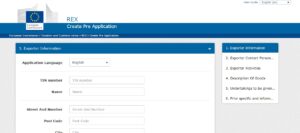
The Department of Trade and Industry Export Marketing Bureau (DTI-EMB) called on exporters anew to register in the European Union’s (EU) Registered Exporter System (REX) before the December 31, 2020 deadline to enjoy preferential tariffs under the EU Generalised Scheme of Preferences Plus (EU GSP+).
REX, the new system of certifying the origin of goods, has been progressively introduced into the EU’s preferential trade arrangements. First applied to the (GSP program on January 1, 2017, REX will eventually completely replace the current system of origin certification. The present system is based on the certificates of origin (CO) issued by government authorities and on invoice declarations made out under certain conditions by economic operators.
Deadline for registration in the system was initially set for December 2019, but was moved to June 30, 2020. The Bureau of Customs (BOC) requested for another extension until December 31, 2020, citing the coronavirus disease pandemic and stakeholders’ difficulty in meeting the deadline, and the request was also granted by the EU.
EMB, which offers REX registration assistance to exporters, has assisted 328 exporters as of August 2020.
READ: Most PH exporters to EU now registered under REX System
BOC Assessment and Operations Coordinating Group deputy commissioner Atty. Edward James Dy Buco earlier said they are confident all exporters to the EU will have registered in the REX System before the new deadline.
Under REX, the economic operators will be the ones to make the so-called “statement on origin,” which is a declaration of origin added by the registered exporter to an invoice, a delivery note, a packing list, or any other commercial document allowing identification of the goods and the exporter.
To be entitled to do this, an economic operator must register in the database of his competent authorities as an exporter. In the Philippines, BOC is the competent authority.
After December 31, 2020, the EU will no longer accept CO Form A.
The Philippines is one of the beneficiary countries of the EU GSP+ program, which grants zero tariff on 6,274 product lines.
These products include particular items of fish, dairy, fruits, vegetables, coconut oils, coffee, cocoa, tobacco, chemicals, fertilizers, essential oils, soaps, articles of plastics and rubber. Also included are articles of wood and leather, apparel, footwear and headgear, ceramic products, glass and glassware, pearls, fine and costume jewelry, furniture, auto and aero parts, ships and boats, electronics and semiconductors, watches, and other manufactured articles.
Last September, the European Parliament recommended the temporary removal of the Philippines from the GSP+ program over alleged continued human rights violations committed in the country.
READ: EU wants PH tariff perks withdrawn over human rights abuses
DTI secretary Ramon M. Lopez earlier stated the country had so far been able to explain objectively its side “on issues that are raised and we don’t see any reason why our GSP+ privilege will be withdrawn.”
The procedure for registration is outlined in the BOC’s Customs Memorandum Order (CMO) 50-2019, which provides the guidelines for the implementation of REX for exporters.
Producers, manufacturers, or traders may apply by filling out the application form available on https://customs.ec.europa.eu/rex-pa-ui/#/create-preapplication/.
Once the application form is filled out and submitted electronically, the exporter should print it and submit it to the concerned BOC Export Division/Unit.
For Philippine Economic Zone Authority (PEZA) locators, the form submitted to BOC must include the Unique Reference Number (URN), while non-PEZA locators should include the Client Profile Registration System (CPRS) or other equivalent document. A product evaluation report may also be submitted if applicable.
During this time of community quarantine, applications together with the other required documents may be submitted online directly to gina.german@customs.gov.ph and ecd@customs.gov.ph or through the BOC portal client.customs.gov.ph.
Since the Philippines was granted EU GSP+ status in 2014, exports to the EU have increased from EUR5.3 billion in 2014 under the regular GSP to EUR7.6 billion in 2019 under GSP+.
For 2019, the Philippines had a 72% utilization of the GSP+, with EUR1.95 billion worth of products granted the privilege, out of the EUR2.7 billion worth of eligible products.
The top GSP+ exports of the Philippines in 2019 included crude coconut oil, vacuum cleaners, prepared or preserved tunas, spectacle lenses, new pneumatic tires, bicycles, electro-thermic hairdressing apparatus, prepared or preserved pineapples, relays, and activated carbon.





